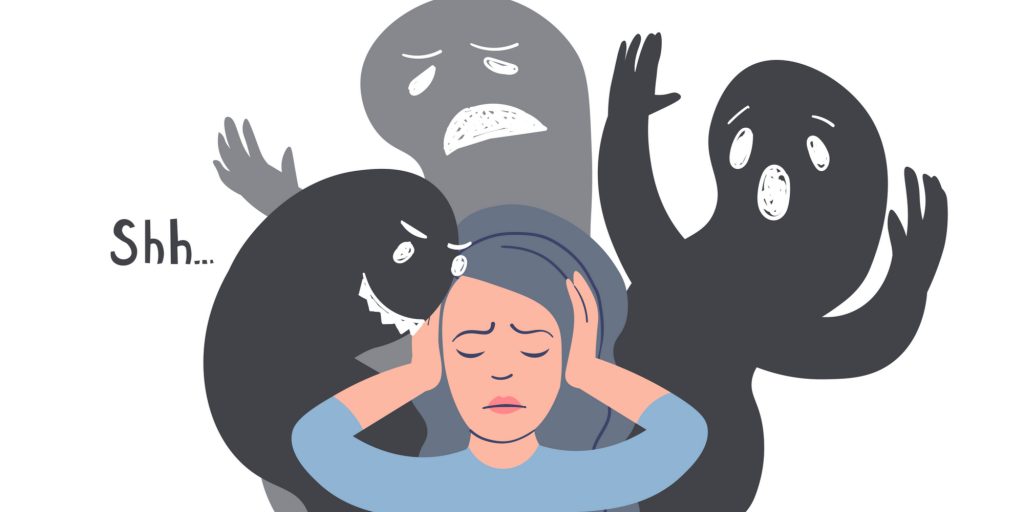Are you wondering if you or a loved one might have OCD or schizophrenia? It can be difficult to tell the difference between these two disorders, but it’s important to know the facts. In this blog post, we will discuss the key differences between OCD and schizophrenia, as well as some of the most common symptoms of each disorder. We will also provide advice on how to get help if you think you might be suffering from OCD or schizophrenia.
Contents
What Is OCD?
 OCD is an anxiety disorder that is characterized by recurrent, unwanted thoughts (obsessions) and/or repetitive behaviors (compulsions). People with OCD often have both obsessions and compulsions. OCD is also a type of mental illness. OCD is not caused by stress.
OCD is an anxiety disorder that is characterized by recurrent, unwanted thoughts (obsessions) and/or repetitive behaviors (compulsions). People with OCD often have both obsessions and compulsions. OCD is also a type of mental illness. OCD is not caused by stress.
Also, OCD is a mental illness that affects about two percent of the population. It usually begins in adolescence or young adulthood, but it can also begin in childhood or later in life. OCD is not caused by stress.
There are many signs of OCD, but some of the most common include:
-Excessive hand-washing or showering
-Checking doors or appliances multiple times to make sure they are turned off
-Arranging items in a certain order or symmetry
-Counting, tapping or repeating certain words or phrases
-Avoiding people, places, or things that might trigger obsessions or compulsions
If you think you might have OCD, it is important to seek professional help. OCD can be a very debilitating disorder, but there are effective treatments available. With proper treatment, most people with OCD can live healthy and productive lives.
What Is Schizophrenia?
 Schizophrenia is a mental illness that affects about one percent of the population. It usually begins in adolescence or young adulthood, but it can also begin in childhood or later in life. Schizophrenia is not caused by stress.
Schizophrenia is a mental illness that affects about one percent of the population. It usually begins in adolescence or young adulthood, but it can also begin in childhood or later in life. Schizophrenia is not caused by stress.
There are many signs of schizophrenia, but some of the most common include:
- Delusions (false beliefs)
- Hallucinations (seeing or hearing things that are not there)
- Disorganized thinking and speech
- Inappropriate emotions or lack of emotion
- Withdrawal from friends and activities
- Poor hygiene and self-care
If you think you might have schizophrenia, it is important to seek professional help. Schizophrenia can be a very debilitating disorder, but there are effective treatments available. With proper treatment, most people with schizophrenia can live healthy and productive lives.
How Are OCD and Schizophrenia Related?

The relationship between OCD and schizophrenia is not fully understood, but there are a few theories that attempt to explain the link. One theory suggests that OCD and schizophrenia share a common genetic vulnerability. Another theory suggests that OCD may be a form of self-medication for people with undiagnosed schizophrenia.
It’s important to remember that just because someone has OCD does not mean they will develop schizophrenia and vice versa. However, if you have either condition, it’s important to seek professional help so you can get the treatment you need.
The relationship between these also two disorders isn’t clear, but some studies suggest that people with OCD may be more likely to develop schizophrenia later in life. So if you have OCD, it’s important to keep an eye out for any signs or symptoms of schizophrenia and seek help from a mental health professional if you start to experience them.
There may be many more questions than answers when it comes to OCD and schizophrenia, but one thing is for sure: if you have either condition, you are not alone. There is help available, and with treatment, you can live a happy and fulfilling life.
Negative Impacts of OCD and Schizophrenia

There are many negative impacts of OCD and Schizophrenia. Some of these impacts are on:
Relationships
One of the most challenging aspects of having OCD or Schizophrenia can be the impact it has on relationships. The constant worry and anxiety can make it difficult to maintain healthy, supportive relationships. In some cases, people with OCD or Schizophrenia may withdraw from friends and family altogether. Sometimes there may also be many arguments and disagreements due to OCD or Schizophrenia.
Work
Another area that can be impacted by OCD or Schizophrenia is work. It can be difficult to focus on tasks and meet deadlines when you are constantly worrying or experiencing hallucinations. This can lead to job loss or difficulty advancing in your career. It can also make it a challenge to find and keep a job.
Self-esteem
OCD and Schizophrenia can also take a toll on self-esteem. The constant anxiety and worry can make you feel like you are not good enough or that you are doing something wrong. The hallucinations can also be frightening and cause you to question your reality. This can all lead to feeling hopeless, helpless, and worthless.
School
OCD and schizophrenia are two very different mental disorders. OCD is an anxiety disorder that is characterized by obsessions and compulsions. Schizophrenia is a mental disorder that is characterized by delusions and hallucinations. While there are some similarities between the two disorders, they are very different.
Quality of Life
Another important factor to consider when diagnosing a mental illness is the impact it has on an individual’s quality of life. In general, OCD and schizophrenia tend to significantly lower an individual’s quality of life. This is because both disorders can be quite debilitating, making it difficult for sufferers to lead normal, productive lives.
Treatment of OCD and Schizophrenia

Treating these two disorders can be difficult, but there are some effective treatments available. Some of these methods are:
Medications
Medications are one of the most common treatments for OCD and schizophrenia. There are many different types of medications available, and the most effective type will vary from person to person. Some of these medications that can help to treat OCD and schizophrenia include:
- Antidepressants
- Anti-anxiety medications
- Antipsychotics
Psychotherapy
Psychotherapy is another common treatment for these disorders. It can help people to understand their disorder and learn how to manage their symptoms. There are many different types of psychotherapy, and the most effective type will vary from person to person. Some of these types of psychotherapy include:
Cognitive behavioral therapy
Cogntive behavioral therapy (CBT) is a type of psychotherapy that helps people to change the way they think about their disorder and their symptoms. CBT can help people with OCD learn how to manage their obsessions and compulsions, and it can help people with schizophrenia to learn how to cope with their hallucinations and delusions.
Exposure Therapy
Exposure Therapy is a type of Cognitive Behavioral Therapy (CBT) that helps people to face their fears. This type of therapy can be very effective for people with OCD, as it can help them to confront their fears and learn how to manage their symptoms.
Family Therapy
Family therapy is another type of psychotherapy that can be helpful for people with OCD or schizophrenia. This type of therapy can help families to understand the disorder and learn how to support their loved ones.
Acceptance and Commitment Therapy
Acceptance and Commitment Therapy (ACT) is a type of psychotherapy that helps people to accept their disorder and learn to live with it. This type of therapy can be helpful for people with OCD or schizophrenia, as it can help them to learn how to cope with their symptoms.
Support Groups
Support groups are another great resource for people with OCD or schizophrenia. These groups provide an opportunity for people to share their experiences and learn from others who are dealing with similar issues. Support groups can be found online or in many communities. These support groups are also a great way to find resources and information about these disorders.
OCD and schizophrenia can be difficult disorders to live with, but there are many effective treatments available. If you or someone you know is struggling with these disorders, please reach out for help. There are many resources available, and there is hope for recovery.
How To Prevent OCD and Schizophrenia?

Prevention is always better than cure. If you are at risk of developing OCD or schizophrenia, there are things you can do to reduce your chances.
For OCD, cognitive behavioral therapy (CBT) is the most effective form of prevention. This type of therapy helps people learn how to change their thinking and behavior patterns. CBT can be done in individual or group sessions.
For schizophrenia, the best form of prevention is early detection and treatment of mental health problems. If you have a family member with schizophrenia, you should be extra vigilant for signs of the disorder. Early treatment can help prevent or lessen the severity of symptoms.
There are also things you can do to reduce your risk of both OCD and schizophrenia:
Get Regular Exercise
Getting regular exercise has been shown to reduce the risk of developing mental health problems like OCD and schizophrenia. Exercise releases endorphins, which have mood-boosting effects. It also helps to reduce stress levels.
Eat a Healthy Diet
Eating a healthy diet is important for overall health and wellbeing. Eating plenty of fruits, vegetables, and whole grains can help reduce the risk of developing mental health problems.
Get Enough Sleep
Getting enough sleep is essential for good physical and mental health. Lack of sleep can increase stress levels and make it difficult to concentrate or think clearly. If you’re having trouble sleeping, talk to your doctor about ways to improve your sleep habits.
Reduce Stress Levels
Stress can trigger or worsen symptoms of mental health disorders. If you’re feeling stressed, try to find ways to relax and reduce your stress levels. Some effective stress-reduction techniques include yoga, meditation, and deep breathing exercises.
These are some of the tips to prevent OCD and schizophrenia. Hope this helps.
Conclusion
OCD and schizophrenia are two very different mental disorders. OCD is an anxiety disorder that is characterized by obsessions and compulsions. Schizophrenia is a mental disorder that is characterized by hallucinations, delusions, and disorganized thinking. Both disorders can be very debilitating, but they are also very different. If you or someone you know has either of these disorders, it is important to seek professional help.
There are many treatment options available for both OCD and schizophrenia, and with the right treatment, people with these disorders can lead happy and fulfilling lives. If you think you might have OCD or schizophrenia, or if you know someone who does, please don’t hesitate to reach out for help. The sooner you get help, the better.
If you’re struggling with OCD or schizophrenia, we want to help. Reach out to us today to learn more about our treatment options. We can help you get your life back on track. Your mental health — Your psychological, emotional, and social well-being — has an impact on every aspect of your life.
Hope this article was of help to you! If you are suffering from OCD and schizophrenia, you may seek help from Therapy Mantra. We have a team of highly trained and experienced therapists who can provide you with the tools and skills necessary for overcoming OCD and schizophrenia. Contact us today to schedule an online therapy or download our free OCD treatment app on Android or iOS for more information.


